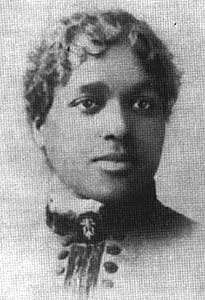Maria Louise Baldwin

Maria Louise Baldwin (September 13, 1856 – January 9, 1922) was an African-American educator and civic leader born in Cambridge, Massachusetts.
Biography
Baldwin was born to Peter L. and Mary E. Baldwin, and received all of her education in Cambridge’s schools. In 1874, Baldwin graduated from Cambridge High School, and a year later she graduated from the Cambridge training school for teachers.
Baldwin first taught in Chestertown, Maryland, for two years. In 1881, she was hired as primary-grade teacher at the Agassiz Grammar School of Cambridge. In 1889, she became principal of the school, making her the first African-American female principal in Massachusetts and the Northeast.[1] As principal, Baldwin supervised white faculty and a predominantly white student body.[1] In 1916, as a new Agassiz school was erected to include higher grades, Baldwin was made master, supervising twelve teachers and five hundred students, all whites. She was one of only two women in the Cambridge school system who held the position of master and the only African American in New England to hold such a position.
Baldwin served as master of Agassiz school for forty years. Under her leadership, the school of Agassiz became one of the best in the city, attended by children of Harvard professors and many of the old Cambridge families. She introduced new methods of teaching mathematics and began art classes. She was the first to introduce the practice of hiring a school nurse. Her school was the only one in the city of Cambridge to establish an “open-air” classroom. One of her students, poet E. E. Cummings described her thus in his book Six Nonlectures:
"Miss Baldwin, the dark lady mentioned in my first nonlecture (and a lady if ever a lady existed) was blessed with a delicious voice, charming manners, and a deep understanding of children. Never did any demidivine dictator more gracefully and easily rule a more unruly and less graceful populace. Her very presence emanated an hour and a glory: the honour of spiritual freedom—not mere freedom from—and the glory of being, not (like most extant mortals) really undead but actually alive. From her I marvellingly learned that the truest power is gentleness."
Baldwin was always a student. She took many classes at Harvard University and other colleges. She also was an instructor who taught summer courses for teachers at Hampton institution in Virginia and the Institute for colored Youth in Cheyney, Pennsylvania.
She belonged to enormous civic and educational organizations including the Twentieth Century Club, the Cantabrigia Club, the Boston Ethical Society, and the league of women for Community Service. She lectured widely and spoke throughout the country on such luminaries as George Washington, Abraham Lincoln, and Thomas Jefferson and on such themes as women’s suffrage, poverty, and history. While she was addressing the council of the Robert Gould Shaw house Association at the Copley Plaza Hotel in Boston, on January 9, 1922, Baldwin collapsed and died suddenly of heart disease.
Legacy
On February 12, 2004, Agassiz School was officially renamed the Maria L. Baldwin School as a result of a campaign initiated by an eighth-grade student at the school and actively supported by other students and the Principal of the school.[2][3] She is mentioned in connection with the League of Women for Community Service on the Boston Women's Heritage Trail.[4]
See also
References
- 1 2 "Claiming Their Citizenship: African American Women From 1624-2009". National Women's History Museum. Retrieved 2013-03-03.
- ↑ "The Mismeasure of Maria Baldwin". Peacework. April 2002. Retrieved 2013-03-03.
- ↑ Dorgan, Lauren R. (May 22, 2002). "Committee Renames Local Agassiz School". The Harvard Crimson. Retrieved 2013-03-03.
- ↑ "South End". Boston Women's Heritage Trail.
Further reading
- The African American Registry: Maria L. Baldwin, graceful educator
- Agassiz Neighborhood Council: Agassiz Neighborhood Notables
- Maria L. Baldwin School: Maria L. Baldwin Biography
- Blackseek.com/black history daily: Maria Baldwin, A Woman of Education